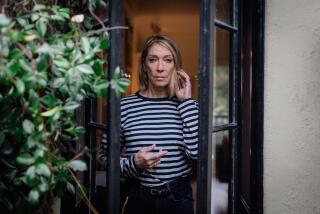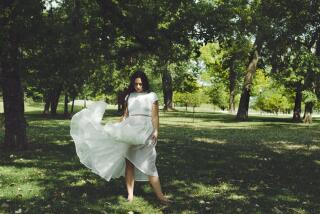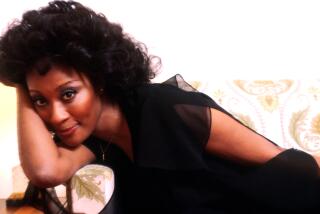Gretchen Parlato keeps her jazz options open
Though this year’s Grammy nominations in jazz are without any Earth-rippling surprises à la last year’s new-artist breakthrough by Esperanza Spalding, L.A.-born singer-songwriter Gretchen Parlato could’ve been considered a solid bet to follow in her footsteps if ours was the sort of world where lightning could strike twice.
Though Parlato’s 2011 album, “The Lost and Found,” was overlooked by the Recording Academy, it was a fixture on many best-of lists at the end of the year, including Rhapsody’s inaugural Jazz Critics’ Poll (formerly hosted at the Village Voice). Touching on a similarly eclectic lineup of influences that includes elements of pop, funk and Brazilian music, the record could sit comfortably next to Spalding’s “Chamber Music Society,” led by Parlato’s lilting voice and a sharp band given ample room to shine. And like the record that helped break Spalding to a national audience, hers isn’t a typical jazz recording.
“It is her sound, her phrasing, her interpretation that makes her interesting,” KCRW host Tom Schnabel wrote in an email. Schnabel also chose “The Lost and Found” as his album of the year on the station’s website. “She’s not just another jazz singer tackling old jazz tunes that have been covered way too much already.”
Indeed, instead of offering another take on “Body and Soul,” Parlato draws from sources across the musical spectrum. On “The Lost and Found,” she adds her own lyrics to songs by Wayne Shorter and Ambrose Akinmusire that sit comfortably alongside covers of Mary J. Blige’s “All That I Can Say” (written by Lauren Hill) and a surprisingly sultry reworking of that dentist-office fixture “Holding Back the Years” by Simply Red’s Mick Hucknall.
“I always had a pretty open mind about all kinds of music,” Parlato said by phone from New York City before starting a West Coast tour that comes to the Musician’s Institute this Saturday as part of the Jazz Bakery’s “Movable Feast” series. “I’ve just enjoyed thinking . . . what are the songs that I have some connection with, and they’ve played a part of my own history? What can I do with them? And I treat them the same way as I would a standard.”
Considering that “The Lost and Found” is only her third album, Parlato has enjoyed a relatively fast rise on the jazz scene, particularly since moving from L.A. to New York City in 2003. Her long list of collaborators includes former instructor Terence Blanchard, saxophonist David Binney and Spalding, who called on Parlato’s backing vocals for three albums, including the upcoming Grammy follow-up “Radio Music Society.”
She is a proud “valley girl” raised in a musical family that included her father, David Parlato, who played with a variety of musicians, including a stint as Frank Zappa’s bassist. Drawn to be a vocalist since she was a child, Parlato studied under Tierney Sutton as a teenager and at the singer’s encouragement applied to become the first vocalist accepted by the Thelonious Monk Institute during its days at USC.
Though her time at USC opened doors that included a 2004 win at the Institute’s jazz vocal competition, Parlato was recently reminded of a pivotal experience from years before in the San Fernando Valley. Drawn to perform with a variety of Brazilian musicians in her early 20s, Parlato recorded a duet with pianist Guilherme Vergueiro on Antonio Carlos Jobim’s “Inútil Paisagem” that was key to her development.
“He allowed me to be OK with something that intimate, just the simplicity and the profoundness of that melody,” she said. “It’s rare when we’re that young that people give us that kind of freedom. And the twist of just singing the melody as written and not feeling like you have to ornament anything ended up being very effective.”
Enlisting pianist and longtime friend Robert Glasper to co-produce her third album, Parlato went into the sessions for “The Lost and Found” with a strong emphasis on ensemble playing. A propulsive yet elastic rhythm section anchors the up-tempo “Circling” and “How We Love,” while Taylor Eigsti’s restless piano shares the spotlight with Parlato on the slow-burning “Winter Wind.” These songs mark some of Parlato’s first forays into songwriting, which proved to be a difficult yet rewarding next step.
“I got in my own way for a long time with my writing,” she said. “There’s so many different ways you can think of the title of this album, “The Lost and Found,” but that can be one of them. Just feeling creatively when you’re kind of lost, and finally something happens and you found that you have something to say. And it’s OK to share it.”
More to Read
The biggest entertainment stories
Get our big stories about Hollywood, film, television, music, arts, culture and more right in your inbox as soon as they publish.
You may occasionally receive promotional content from the Los Angeles Times.







